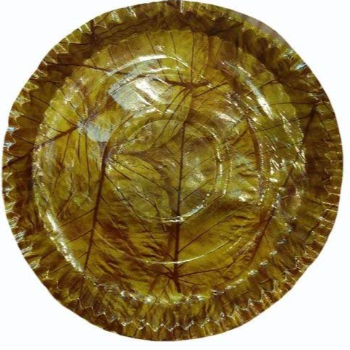In the bustling heart of Kolkata, where the Ganges whispers age-old secrets to the city, lives a remarkable woman named Ananya Roy. Ananya, a 35-year-old school teacher, has always been deeply connected to her roots. Her fondest memories are of family gatherings during Durga Puja, where traditional Bengali meals were served on salpatta plates, a practice passed down through generations. As the world shifts towards convenience, Ananya faces a pressing dilemma how to uphold her heritage while embracing sustainability in a rapidly modernizing society.
Salpatta paper plates, crafted from the leaves of the sal tree, offer an elegant solution. They bridge the gap between tradition and modern-day sustainability, turning every meal into a celebration of culture and environmental consciousness. Ananya’s story reflects the journey of many Indians who seek to preserve their cultural identity while contributing to a greener planet.
A Tradition Worth Keeping
For many Indian families, salpatta leaves are not just dining accessories; they are a symbol of tradition and togetherness. They remind Ananya of her grandmother’s kitchen, filled with the aroma of freshly cooked luchis and the sound of laughter. Serving food on salpatta plates was more than just a practical choice; it was a way to honor their ancestors and the land that nourished them.
However, as urban life accelerated, plastic and styrofoam infiltrated even the most sacred rituals. Ananya found herself torn between convenience and her commitment to the environment. The dilemma was clear How can one maintain cultural traditions without contributing to the planet's degradation?
The Eco-Friendly Solution
Enter salpatta paper plates, which are made by artisans using traditional techniques that have been passed down through the generations. These plates are biodegradable, compostable, and free from harmful chemicals, offering a sustainable alternative to their plastic counterparts. With every meal served on a salpatta plate, Ananya not only preserves her cultural heritage but also makes an eco-friendly choice that reduces her carbon footprint.
In India, where festivals and gatherings are a way of life, switching to salpatta plates can significantly impact the environment. Studies have shown that using biodegradable plates can reduce landfill waste and decrease pollution, making a tangible difference in combating climate change.
A Community Movement
Ananya’s choice to use salpatta paper plates sparked conversations among her friends and family. They were intrigued by the idea of bringing back a piece of their heritage in a way that aligns with modern values. Inspired by Ananya’s resolve, her neighbor, Rajesh, decided to use salpatta plates for his son’s birthday party. The guests were impressed by the plates’ aesthetics and practicality, and many left with a newfound appreciation for sustainable living.
As more people in Ananya's community embraced salpatta plates, a ripple effect began. Local vendors reported an increase in demand, leading to more employment opportunities for artisans who craft these plates. This movement not only supported the environment but also empowered rural communities, providing them with a steady source of income.
Embracing the Change
For Ananya, the decision to choose salpatta paper plates was more than just an environmental choice; it was an emotional one. She found peace in knowing that her actions honored her ancestors while paving the way for a healthier planet for her children. Each meal became a testament to the power of tradition and innovation working hand in hand.
As India stands on the cusp of change, the story of salpatta paper plates serves as a reminder that the journey to sustainability begins with small, meaningful choices. By choosing these plates, we honor our past, embrace our present, and protect our future.
In the words of Ananya, “With every meal shared on a salpatta plate, we celebrate our heritage and our commitment to a better world.”
Join the movement. Choose salpatta, choose sustainability, and let every meal tell a story of hope and tradition.
Visit Vyaparify Site:
https://id.vyaparify.com/induramsonsLocation:
https://maps.app.goo.gl/cnyQXMBWEYyQ1yUk7 
